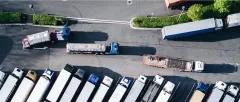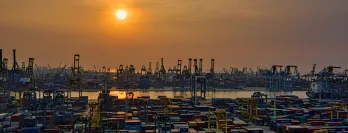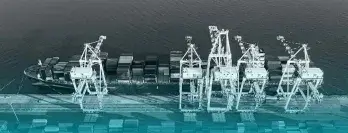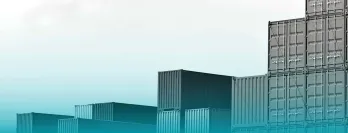
Transport & Logistics
As the leading customs expert in Europe, we can offer you individual customs solutions tailored to the specific demands of transport and logistics companies. Our customs specialists can advise you on the following topics:
- Preparation of customs documentation, permits and certificates
- Support in complying with regulations and requirements for the transport and logistics industry
- Monitoring and control of customs formalities during the transportation process

Customs Challenges | Transport & Logistics
Logistics and transportation companies often struggle with their customs clearance due to complex customs processes as well as ongoing changes in customs regulations and the classification of goods. It is crucial to ensure the correct classification of goods to calculate the correct customs rates and taxes and help use the appropriate trade agreements.
However, when transportation companies lack customs knowledge, they risk making mistakes that can be expensive to redeem.
Another hurdle when it comes to customs clearance is the preparation of customs documents, which can be lengthy and have to be filled out precisely, since errors or incompleteness can lead to delays and penalties.
Import and export compliance represents another challenge for logistics and transportation companies, as destination countries have different regulations that must be met. Companies that are unable to comply with these regulations can face heavy fines and delays in transportation.
Customs Solutions | Transport and Logistics
Customs Support offers expert customs advice and services to improve customs processes in the transport and logistics industry, enabling them to overcome customs processing challenges.
Our customs experts can advise you on:
- Planning and implementing your customs clearance
- Handling customs formalities and monitoring compliance with import and export regulations
- Classification of goods and determination of customs rates and taxes
- Verification of the accuracy and completeness of customs documents and invoices
- Increasing efficiency and reducing operating costs through a fast and effective customs process in logistics

Frequently Asked Questions | Transport and Logistics
What are the main challenges logistics and transportation businesses face when it comes to customs clearance?
Complex customs regulations and the need for seamless coordination of logistics service processes make customs clearance in the transport and logistics industry challenging. Work with our customs experts - they have extensive industry knowledge and can offer you customised solutions to overcome your challenges.
How does Customs Support help transport and logistics companies with customs clearance?
Our customs experts support transportation companies with the processing of customs formalities, the monitoring of import and export regulations and the classification of goods. In addition, they can assist with the preparation of customs documents and advise on compliance with industry-specific regulations, significantly helping streamline the customs clearance process.
How can I ensure that my transport and logistics service processes run smoothly?
Smooth customs processes in the logistics service industry rely on comprehensive expertise and specific industry knowledge. Our customs experts offer individual solutions to help meet your specific requirements and optimise your customs processes. By monitoring and controlling your customs processes with our state-of-the-art technology, we can minimise the risk of delays or penalties.
How can digital technologies streamline my customs operations in the logistics service industry?
Our digital technologies allow us to provide timely and accurate customs services that help optimise customs clearance processes in the logistics service industry. Our customs specialists use state-of-the-art customs software to automate and speed up customs processes, reducing the risk of delays or penalties for our customers.
What are the benefits of full-service customs services for transportation companies?
Full-service customs services can offer transportation companies tailored solutions to help them handle their customs matters efficiently and smoothly. Using the latest customs software and expertise, our Customs Support experts can deliver timely and accurate results, helping you save time and money.
Customs Support Offers End-to-End Customs Services

Full-Service Customs Expertise
We have it covered end-to-end: everything from processing declarations, consultancy to supply chain optimization

Experienced Customs Specialists
Our 1900+ experts with over 20+ years of industry experience ensure the highest compliance standards

Digital Customs Solutions
Our cutting-edge IT solutions enable you to monitor all processes 24/7, while we adapt to digital trends to ensure your security standards

Global Knowledge, Local Presence
We link your local customs needs to our global network of professionals across 100+ strategic locations in Europe

Transport & Logistics
Incoterms Explained: Delivery Duty Paid (DDP)
When goods are bought or sold “Delivery Duty Paid” (DDP) it means that the Seller delivers the goods to a place previously agreed to by the seller and the buyer. This can be any location. The agreed place of delivery (e.g. the terminal) needs to be specifically named.

Releasing Non-Union Goods into Free Circulation
When you import goods into the European Union you have to bring them into Free Circulation. Free Circulation implies non-Union goods which have been cleared by European customs, allowing you to sell or utilise these goods within countries in the European Union.


















